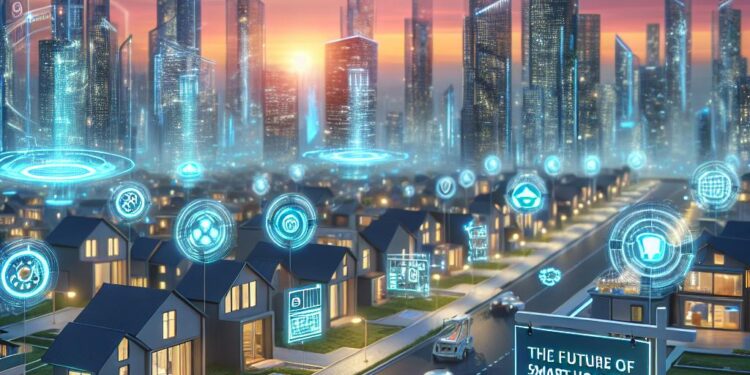The future of smart homes in real estate is reshaping how we think about investment and financial planning. These tech-savvy homes, equipped with smart devices like thermostats and lights you can control with an app, are not just futuristic gadgets—they’re savvy investments with potential for increased property value and lower energy costs. Yet, many underestimate this impact, missing out on long-term wealth opportunities. This blog aims to debunk those misconceptions and offer practical guidance. By understanding the smart home trend, you can make informed decisions and position yourself strategically in the real estate market, enhancing financial security and building lasting wealth.
What is the Future of Smart Homes?
The future of smart homes in real estate is all about innovation meeting convenience. Imagine a home where you can control the lights, thermostat, and security system with just a few taps on your smartphone. Sounds like science fiction, right? But it’s already happening! Smart homes are becoming the norm, and they offer a golden opportunity for investors looking to step up their game. Not only do they promise energy savings, leading to lower bills, but they also increase a property’s value over time. Think of it like upgrading from a regular car to a hybrid one; the initial cost might be higher, but the long-term savings and resale value make it worthwhile. For those plotting their investment strategy, incorporating smart home technology into real estate can be a brilliant move, fitting right into wealth planning by ensuring your assets grow while enjoying cutting-edge comforts. Isn’t that a win-win?How Do Smart Homes Shape Real Estate’s Future?
Understanding ‘The Future of Smart Homes in Real Estate’ is crucial as it represents a seismic shift in how homes are designed, sold, and lived in. As technology advances, smart homes are becoming the norm, equipped with devices that can improve efficiency and sustainability. Being aware of these trends helps homeowners, investors, and real estate professionals make informed decisions in a rapidly evolving market. It’s essential to comprehend how smart home technology influences property values, buyer preferences, and energy use. Staying updated on these developments ensures you’re not left behind in a tech-driven world where smart homes are increasingly integral.The Future of Smart Homes in Real Estate
– Identify Investment Opportunities: Investors interested in smart homes often start by researching neighborhoods where smart home technology is in demand. They look for properties with built-in tech or the potential to be upgraded with smart features like voice-controlled assistants and energy-efficient systems. This research is crucial in forecasting future returns.– Evaluate Technological Integration: Platforms that focus on smart home tech play a critical role in showcasing properties with advanced automation capabilities. Investors use these platforms to understand property’s technology and how it might appeal to tech-savvy buyers or renters.
– Consult Financial Advisors: Advisors help investors assess the return on investment (ROI) potential of smart properties. They consider the cost of technology upgrades versus expected increases in property value or rental income.
– Comply with Regulations: Before diving into smart home investments, investors must navigate local regulations concerning tech installations and tenant privacy. Regulators often provide guidelines on tech deployment and data protection.
– Monitor Market Trends: Keeping an eye on market trends is crucial. Investors stay informed about the latest in smart technology innovations, ensuring their properties remain competitive and appealing in an ever-evolving market.
Pros and Cons: How Smart Homes Transform Real Estate’s Future
| Benefits | Risks/Disadvantages |
|---|---|
|
|
Exploring Smart Homes’ Impact on Real Estate’s Future Value Growth
1. Improved Energy Efficiency: Smart homes are leveraging technology to optimise energy use. Programmable thermostats and smart lighting systems help homeowners and institutions save significantly on energy bills, leading to more sustainable living.2. Enhanced Property Value: Real estate agents note that homes equipped with smart devices often fetch higher prices. Prospective buyers are drawn to the convenience and security features, making these properties more desirable in the market.
3. Increased Security Measures: Homeowners are using smart security systems like cameras and alarms that can be monitored via smartphones. This added security provides peace of mind and deters potential burglars.
4. Convenience and Automation: Families enjoy the ease of controlling home functions with voice assistants. From adjusting the thermostat to dimming lights, smart homes offer unparalleled convenience.
5. Success Story: A family in London transformed their classic townhouse into a smart home, resulting in a 20% reduction in energy costs and a 15% increase in property value.
However, caution is advised. A homeowner in Manchester reported a smart thermostat malfunction that resulted in a significant spike in energy usage, highlighting the importance of regular device updates and maintenance.
Smart Homes vs Traditional Homes: A Glimpse into Real Estate’s Future
| Resource | Description |
|---|---|
| YouTube: “Tech With Tim” | Explores technology trends, including the integration of smart home devices into real estate. Offers practical tips and insights in a user-friendly format. |
| Website: SmartHomeSociety.co.uk | Features articles and industry updates on smart home advancements and their impact on real estate. Ideal for staying current on market trends. |
| Online Course: LinkedIn Learning – Smart Home Essentials | Covers the basics of smart home technology and its application in real estate. Provides actionable knowledge for those looking to invest in smart homes. |
| Expert Voice: Sarah Richardson | A leading authority on smart home innovation in real estate. Frequently shares insights on future trends and potential investment opportunities. |
| Book: “The Smart Home Revolution” by Milo Johnson | An in-depth exploration of how smart technology is transforming the real estate market, offering predictions and strategies for investors. |
Mastering Finance for Modern Freelancers: Boost Your Wealth Wisely
- Tech-Savvy Millennials: Known for embracing the latest gadgets, these individuals find smart homes a perfect fit for their lifestyle. They value innovation and convenience, making smart homes an attractive investment.
- Risk-Tolerant Investors: These individuals seek out opportunities that may yield high returns. They understand the potential growth of smart home technology and are willing to invest early for potential rewards.
- Early Retirees: Looking for comfort and ease, early retirees might invest in smart homes to simplify daily tasks and maintain an independent lifestyle, while potentially growing their financial portfolio.
Smart Home Innovations Shaping Real Estate’s Future
Exploring where the future of smart homes in real estate is heading is both fascinating and exciting. Here are a few key areas to watch:- Tech Improvements: Expect more seamless integration and interoperability of devices, allowing full home automation with AI. As technology grows, systems will adapt to your preferences more intuitively, enhancing convenience.
- New Policies: Governments might introduce stricter standards for energy efficiency and data privacy. Incentives for adopting eco-friendly smart technologies could also become more common, encouraging widespread use.
- Market Trends: Demand for smart homes is likely to increase, especially among tech-savvy buyers and those interested in sustainability. This trend could push property developers to prioritize smart innovations in new projects.














